 Petzlover
Petzlover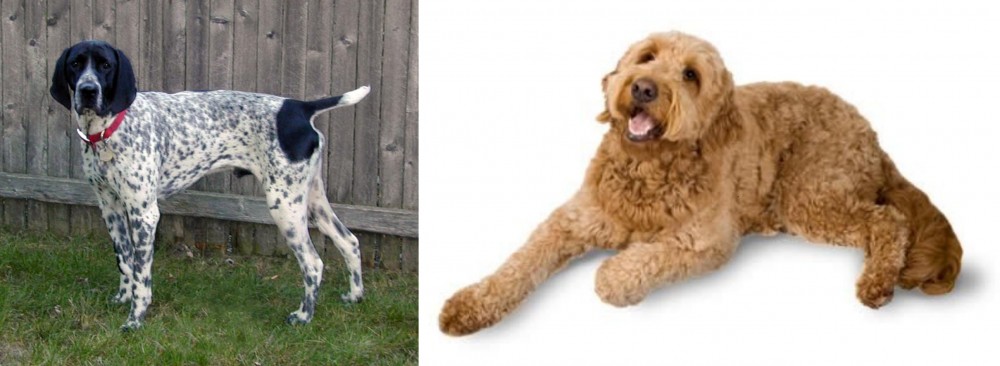 Braque d'Auvergne is originated from France but Golden Doodle is originated from United States. Both Braque d'Auvergne and Golden Doodle are having almost same height. Braque d'Auvergne may weigh 42 kg / 93 pounds more than Golden Doodle. Both Braque d'Auvergne and Golden Doodle has same life span. Both Braque d'Auvergne and Golden Doodle has almost same litter size. Braque d'Auvergne requires Low Maintenance. But Golden Doodle requires Moderate Maintenance
Braque d'Auvergne is originated from France but Golden Doodle is originated from United States. Both Braque d'Auvergne and Golden Doodle are having almost same height. Braque d'Auvergne may weigh 42 kg / 93 pounds more than Golden Doodle. Both Braque d'Auvergne and Golden Doodle has same life span. Both Braque d'Auvergne and Golden Doodle has almost same litter size. Braque d'Auvergne requires Low Maintenance. But Golden Doodle requires Moderate Maintenance
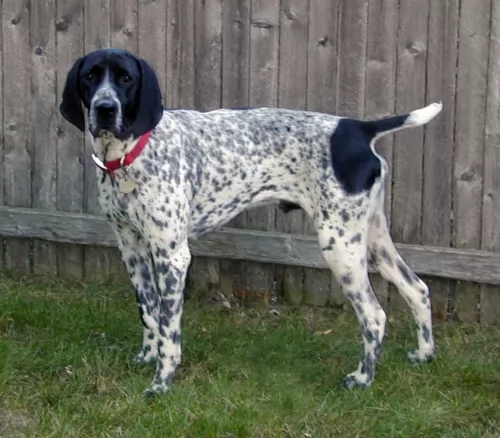 Sometime over 5 centuries ago, in the Cantal Region of France, was born a hunting breed, that might be the real ancestor of today’s pointing hunter dogs. Perhaps the oldest of all pointing gun dog is the Braque d’Auvergne. This breed comes from Central France in the region of Auvergne. This breed was developed prior to written dog breeding records in order to hunt in this region and find, point, flush out and retrieve fowl. This breed is clearly one of if not the oldest breeds in the French Braque. There is no agreement among historians on what breed is the oldest of the European pointing dogs and where they were developed – was it Spain or was it France? It is thought that the Braque Francais Gascogne is the original one of these in the early 1600’s while the Braque d’Auvergne came soon after. Due to the different hunting needs in the different parts of France, the Braque Francais Gascogne was crossed with a lot of other local scent hounds. The Braque d’Auvergne is one of the very oldest of all of these. There are records of the breeds existence in the 1700’s. It is probable that the Braque d’Auvergne was developed by crossing local dogs with Gascogne as well as with the Petit Bleu de Gascogne and the Grand Bleu de Gascogne.
Sometime over 5 centuries ago, in the Cantal Region of France, was born a hunting breed, that might be the real ancestor of today’s pointing hunter dogs. Perhaps the oldest of all pointing gun dog is the Braque d’Auvergne. This breed comes from Central France in the region of Auvergne. This breed was developed prior to written dog breeding records in order to hunt in this region and find, point, flush out and retrieve fowl. This breed is clearly one of if not the oldest breeds in the French Braque. There is no agreement among historians on what breed is the oldest of the European pointing dogs and where they were developed – was it Spain or was it France? It is thought that the Braque Francais Gascogne is the original one of these in the early 1600’s while the Braque d’Auvergne came soon after. Due to the different hunting needs in the different parts of France, the Braque Francais Gascogne was crossed with a lot of other local scent hounds. The Braque d’Auvergne is one of the very oldest of all of these. There are records of the breeds existence in the 1700’s. It is probable that the Braque d’Auvergne was developed by crossing local dogs with Gascogne as well as with the Petit Bleu de Gascogne and the Grand Bleu de Gascogne.
In all of Western Europe, the region of Auvergne is not very populated and has unique geography in that is hilly and has many extinct and eroded volcanoes. A lot of the region is still unpopulated. In this environment, wildlife has flourished, and hunting is successful in providing food for the regions people. This circumstance with an abundance of birds, led to the breeding of the Braque Auvergne to specialize in hunting in this area. The breed is not very popular outside of Auvergne and probably never was. That fact allowed them to be devastated by the Second World War. The Reunion des Amateurs de Braque d’Auvergne (RABA) was started to promote the pure breeding and the protection of the d’Auvergnes. But when Auvergnes was occupied during the war, the slowed breeding of the Braque d ‘ Auvergne almost eliminated the breed. There might have only been about 25 dogs left following the end of the war. These remaining dogs were used to revive the breed, but it is still uncommon, but not rare. Individuals have been imported by other countries including North America. The United Kennel Club (UKC) accepted the breed in 2006 but is not accepted by the AKC (American Kennel Club). The breed is still a working breed and outside of France, very rare.
 The Goldendoodle, known fondly as the Golden Poo, originates from the USA and was first bred in the 1990’s, coming about because of two popular dog breeds being mated together – the Golden Labrador and the Poodle.
The Goldendoodle, known fondly as the Golden Poo, originates from the USA and was first bred in the 1990’s, coming about because of two popular dog breeds being mated together – the Golden Labrador and the Poodle.
He isn’t recognized as a standardized breed by any of the major kennel clubs. The beautiful dog was first bred in 1969 by Monica Dickens, and of course when everybody saw the little golden ball of sheer delight, everybody wanted one and the dog’s popularity soared.
The original purpose of the cross-breed was to develop guide dogs which would go down well with people with allergies. Today, not all Goldendoodles are hypoallergenic, but they’re also popular because they have a low shedding coat.
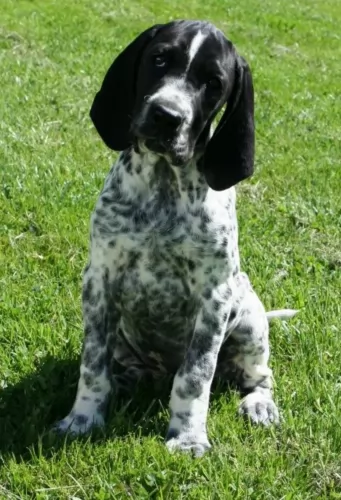 The Braque d’Auvergne is a well built, strong hunting dog with long ears, a large head and a docked tail. His coat is white with black markings and black ears and head. The breed looks a lot like all the other pointing dogs from France. They are medium in stature and has the appearance of a working gundog. He is athletic, muscular and fit. Docking the tail is outlawed in many countries and all of the United Kingdom. In that case the tail is high on the rump and always straight. Their face and head are big for the size of the body and shaped like an oval. With a long muzzle, deep set eyes and a gentle expression, they are kindly and handsome dogs. Their skin is loose but not droopy or wrinkled like hound dogs.
The Braque d’Auvergne is a well built, strong hunting dog with long ears, a large head and a docked tail. His coat is white with black markings and black ears and head. The breed looks a lot like all the other pointing dogs from France. They are medium in stature and has the appearance of a working gundog. He is athletic, muscular and fit. Docking the tail is outlawed in many countries and all of the United Kingdom. In that case the tail is high on the rump and always straight. Their face and head are big for the size of the body and shaped like an oval. With a long muzzle, deep set eyes and a gentle expression, they are kindly and handsome dogs. Their skin is loose but not droopy or wrinkled like hound dogs.
 The Goldendoodle is a medium sized dog, standing between 61 -66 cm in height and weighing between 14 – 20kg. Nothing is set in stone with regards to his size as the Poodle can be Toy, Miniature and Standard, meaning the Goldendoodle can be a smallish dog or he can be a large dog.
The Goldendoodle is a medium sized dog, standing between 61 -66 cm in height and weighing between 14 – 20kg. Nothing is set in stone with regards to his size as the Poodle can be Toy, Miniature and Standard, meaning the Goldendoodle can be a smallish dog or he can be a large dog.
His coat is usually golden, cream, yellow, red and even leaning towards brown or black. It is mostly medium length and wavy or even curly. Many Goldendoodle owners send their pets in to have their coats professionally shorn.
He has medium length, floppy ears and the tail is long.
Making the most wonderful family pet and companion, Goldendoodles have just the right temperament for them to be used as therapy- or rescue dogs. They’re bright, outgoing alert, social, gentle, loving, patient with children, adults and pets and friendly and amicable as well.
They’ve inherited wonderful characteristics from both the poodle and the Golden Labrador. He is an energetic dog so even though he adapts well to city life or country life, he will need to have exercise as in walks and ball games.
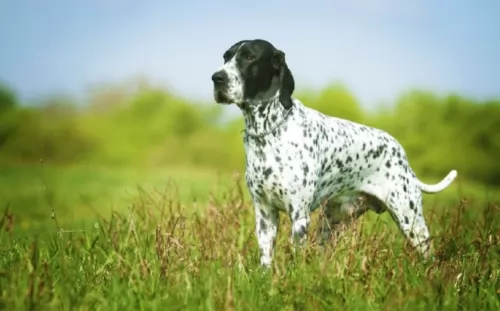 This is a gentle, adaptable and obedient breed. With their intelligence and affectionate nature, they make great family dogs and are eager to please their people. Living with other dogs is fine but not with small, prey size animals. The Braque d’Auvergne should never be left alone pets like gerbils and hamsters. They must be socialized to cats as pets and not prey before living with them successfully. They need to work closely with one human partner. They are first and foremost a hunting dog and need some sort of hunting simulation. They are devoted to their families and want to be constantly in their presence. This can lead to separation anxiety if they are left alone too much. They are great with children and need a family.
This is a gentle, adaptable and obedient breed. With their intelligence and affectionate nature, they make great family dogs and are eager to please their people. Living with other dogs is fine but not with small, prey size animals. The Braque d’Auvergne should never be left alone pets like gerbils and hamsters. They must be socialized to cats as pets and not prey before living with them successfully. They need to work closely with one human partner. They are first and foremost a hunting dog and need some sort of hunting simulation. They are devoted to their families and want to be constantly in their presence. This can lead to separation anxiety if they are left alone too much. They are great with children and need a family.
 Your Goldendoodle is sure to be a real joy in your home. He is a lively, healthy dog breed and when you treat him like a family member, a real deep bond can be developed.
Your Goldendoodle is sure to be a real joy in your home. He is a lively, healthy dog breed and when you treat him like a family member, a real deep bond can be developed.
He loves to be included in everything going on in the household and doesn't like being left alone for a long time. He has wonderful characteristics from the Golden Retriever and the Poodle as both these dog breeds are known for their friendly, patient, kind, amicable and intelligent personalities.
Easy to train, your Goldendoodle is obedient and wants to please, and is just waiting to become a loyal, loving friend in your family.
 The Braque d’Auvergne is a healthy breed but can face some of the same health concerns as other pointers and hunting dogs. The long, droopy ears can get infected easily if wet and need to be cleaned regularly so that food or dirt are not trapped their either. Because of the small gene pool however they may be at risk for several issues. The breeders in France express concerns about possible hip dysplasia and testing is highly recommended. Because they are at risk for other conditions that might not show up until later in life, it is also recommended that they be tested by the Canine Eye Registration Foundation (CERF) as well as the Orthopedic Foundation for Animals (OFA).
The Braque d’Auvergne is a healthy breed but can face some of the same health concerns as other pointers and hunting dogs. The long, droopy ears can get infected easily if wet and need to be cleaned regularly so that food or dirt are not trapped their either. Because of the small gene pool however they may be at risk for several issues. The breeders in France express concerns about possible hip dysplasia and testing is highly recommended. Because they are at risk for other conditions that might not show up until later in life, it is also recommended that they be tested by the Canine Eye Registration Foundation (CERF) as well as the Orthopedic Foundation for Animals (OFA).
 The Goldendoodle is a healthy dog, but each breed involved with bringing about the Goldendoodle - Poodles and Golden Retrievers – can be prone to hip dysplasia. Both dog breeds are also susceptible to inheritable eye disorders.
The Goldendoodle is a healthy dog, but each breed involved with bringing about the Goldendoodle - Poodles and Golden Retrievers – can be prone to hip dysplasia. Both dog breeds are also susceptible to inheritable eye disorders.
There are some common dog ailments worth knowing about. The idea is to get your pet to the vet as soon as possible when you detect that he isn’t his usual self.
Allergic skin disease is common in other dog breeds as well, and once the allergen is inhaled or absorbed, your pet can battle terribly with itchy, red skin. This inflammatory, chronic skin disease can drive your pet mad and you’ll see him scratching and licking continually. Get him to the vet as soon as possible because it may just be a case of changing his diet.
This is something that can even be seen in young dogs when the hip joints don’t develop normally. It can cause arthritis, terrible pain and lameness with your pet.
You’ll notice that your pet battles to see- and get around at night. Signs of night blindness can lead to loss of vision, particularly with your middle-aged Goldendoodle.
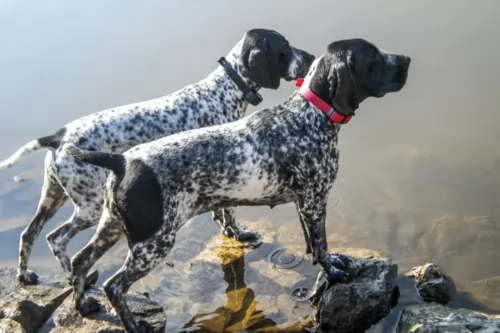 The Braque d’Auvergne needs a high-quality diet fit for a working dog but not too much to make him obese. They are an active breed to choose a formula that is designed for working dogs.
The Braque d’Auvergne needs a high-quality diet fit for a working dog but not too much to make him obese. They are an active breed to choose a formula that is designed for working dogs.
Although no studies have been conducted on the Braque d’Auvergne’s health issues there are many conditions that similar breeds are susceptible to and the d’Auvergne might be as well. This includes any of the following:
This is an active, working dog who needs a lot of stimulation and exercise. The only real appropriate exercise for these dogs is hunting or outings in the woods. He not only needs the exercise, but he also needs to stimulate his sense of smell and his gundog intelligence. He might excel in lure chase or even a form or barn hunt. They certainly could excel at obedience trials and perhaps rally. If you are a weekend hunter then this is the ideal dog for you. They are so easy to train that they surpass other pointers for success with casual hunters. They hunt at a slower pace than many other gundogs. Their intelligence and athleticism lend itself well to agility and flyball also. They need a large (+acres)fenced in area to run and play.
 Taking care of a Goldendoodle isn't only about feeding him and seeing he has a fresh bowl of water available. It’s about making him part of the family and giving him love and attention just like with any family member. He needs -
Taking care of a Goldendoodle isn't only about feeding him and seeing he has a fresh bowl of water available. It’s about making him part of the family and giving him love and attention just like with any family member. He needs -
Good nutritious food to keep him healthy.
A warm dry place to sleep at night.
A place during the day that offers shade from the sun and shelter from the rain.
He needs to be brushed to remove loose hairs, have his nails trimmed, his ears checked for infection and his teeth brushed 2 or 3 times a week.
He needs to be exercised – walks, ball and rope games, swimming and joining you in your activities.
He needs to be taken to the vet when he is showing signs of illness.
He needs love, care and attention just like any other family member.